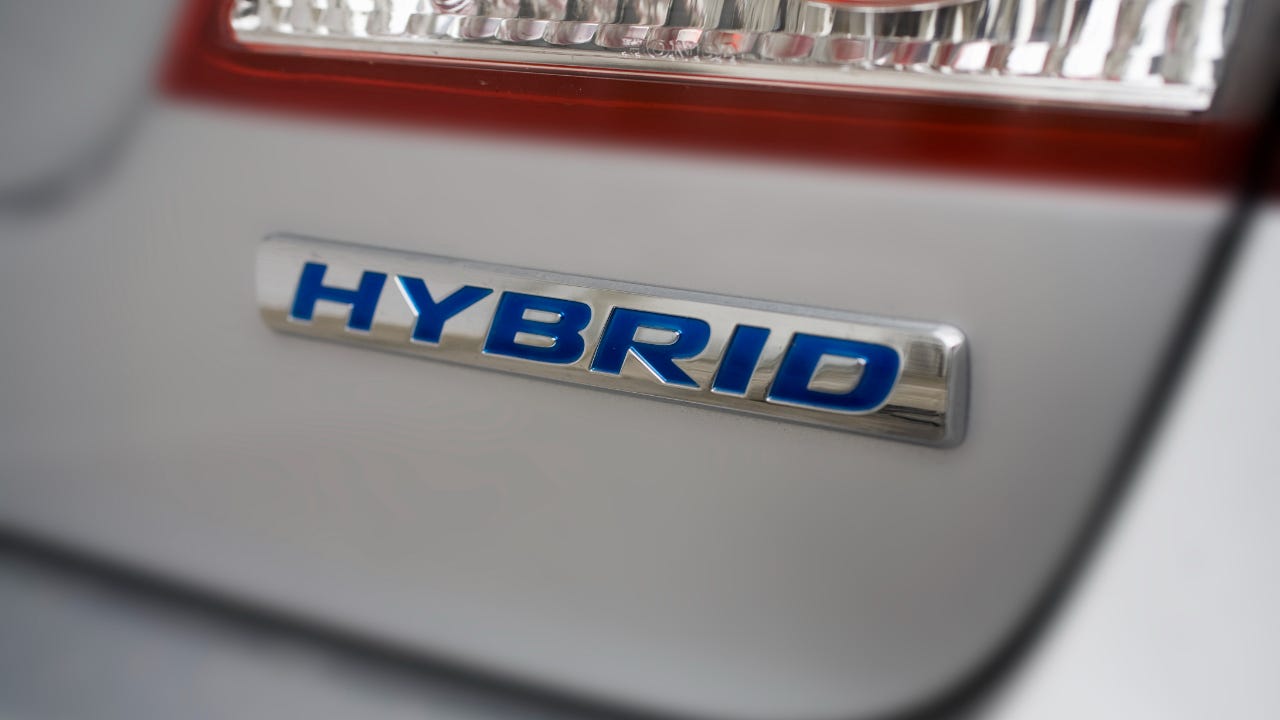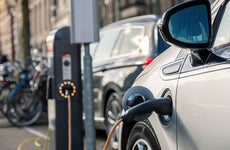Electric vs. hybrid cars: How to choose which is right for you

The Bankrate promise
At Bankrate we strive to help you make smarter financial decisions. While we adhere to strict , this post may contain references to products from our partners. Here's an explanation for .
Key takeaways
- Hybrid cars use both gas and electricity, plug-in hybrids have a large rechargeable battery and EVs are electric only.
- Hybrids and plug-in hybrids are generally a better choice if you don't want to plan trip routes in detail.
- EVs are a better choice if you have a lot of charging stations in your area, want to completely get rid of gas costs or have an eye on reducing your carbon footprint as much as you're able.
If you are in the market for a new vehicle, you might be thinking about an entirely new approach to driving that involves fewer — or no — trips to the gas station. As more car manufacturers unveil new electric-powered models, drivers are pondering making the switch. Data from a 2024 GBK Collective study showed half of American households are considering making their next car a hybrid or electric vehicle.
If you are in that crowd, there is a bigger question you’ll need to answer. Should you leave some room for gas or go all-in on electric? Compare the upsides and downsides of electric vs hybrid cars before you head to the dealer.
The differences between hybrid and EV
Hybrid cars, plug-in hybrid electric vehicles (PHEVs) and electric vehicles (EVs) are all designed to help you curb or cut fuel costs. However, there are key differences between them to be aware of.
- Hybrid models can use gasoline or electricity as a power source. They’re equipped with both an electric motor and a gasoline engine that work together to operate the vehicle. They do not qualify for the federal EV tax credit.
- Plug-in hybrid models are similar to hybrid vehicles but have a large rechargeable battery. If you operate the vehicle while the battery is charged up, your gasoline is preserved. Once the battery’s charge is low, the gasoline engine kicks in so the car can drive on as a regular hybrid.
- EVs are solely battery-operated and only have an electric motor. You won’t find a gas tank or engine inside this vehicle.
When looking at EV or hybrid cars, remember that hybrids tend to cost less upfront than fully electric vehicles. However, EVs and PHEVs might qualify for up to $7,500 in federal tax incentives.
EV or hybrid: How to choose
There is no right or wrong answer when choosing between hybrid vs. electric cars. Instead, you must consider many factors, including where you live, what you currently spend on gas, how committed you are to reducing your carbon footprint and more.
“If you don’t want to plan out the miles on your route, you feel as though you have range anxiety or may not have many charge stations around, a plug-in hybrid is a better choice for you,” says Ronald Montoya, senior consumer advice editor at Edmunds.
Apps such as PlugShare can help you find local charging stations.
Start with the U.S. Department of Energy’s plug-in hybrid calculator if you’re considering a specific hybrid model. You can share some information on your driving habits and your home power setup. You’ll get an estimate of your annual fuel and electricity costs and number of trips to the gas station.
“If you are OK with planning your routes in terms of mileage and have a charger at home or work,” Montoya says, “you’re the ideal candidate for an all-electric vehicle.” Visit the Electrify America map to see charging stations near you.
Hybrid pros and cons
As you analyze the numbers from the plug-in hybrid calculator, here’s a rundown of hybrid vehicles’ major pros and cons.
Pros
- You won’t worry about running out of power. Because hybrid vehicles can use gas, you will be covered by more than 145,000 gas stations in the country.
- You’ll generally spend less money each month. Hybrid vehicles tend to have starting prices than all-electric vehicles. For example, the 2024 hybrid Kia Nero starts at $26,940, while the EV version starts at $39,600 and includes more luxury features even on the basic trim.
Cons
- You’re still going to spend at the pump. Hybrid vehicles don’t have a long range for operating on electricity, making gasoline the primary power source for longer road trips. For example, the Environmental Protection Agency sets the Toyota RAV4 Hybrid’s electric-only range at 42 miles.
- Unlike PHEVs, hybrid vehicles do not qualify for the federal EV tax credit.
- You’re still going to emit plenty of carbon from burning gas. If you’re serious about lowering your carbon footprint, you should know that a hybrid car’s gas usage will continue to play a role in polluting the planet.
Full electric car benefits and drawbacks
Even ideal candidates must weigh the benefits and drawbacks of purchasing a new electric vehicle.
Pros
- You can skip out on paying high gas prices. As of Feb. 9, 2024, the average cost of a gallon of regular gas is $3.17, according to AAA. Meanwhile, the price of home charging an electric vehicle is equal to $1.41 per gallon.
- If purchased new, qualifying fully electric vehicles qualify for up to a $7,500 federal tax credit. There is also an EV charger tax credit.
- You’ll make a positive impact on the planet. As businesses and governments try to figure out how to tackle climate change, individuals can do something about it, too. “If your goal is to completely get off fossil fuels, you’ll want an EV,” Montoya says.
- Electric car prices are dropping. As of December 2023, Kelley Blue Book listed the average new EV price at $50,798 and gas vehicles at $48,759, so EVs are more closely matching gas cars in price.
Cons
- You might need to search for a place to charge your car. “You’ll find that both coasts of the U.S. have the most charge stations,” Montoya says. “It’s when you get into the north-central states like Montana, North Dakota and Wyoming where they become more sparse.” But charging stations are multiplying rapidly.
- Charging can be time-consuming. While fast public charging stations are becoming more common, basic charging stations take a long time to deliver the juice to go far. For example, 120V charging stations only grant two to five miles of driving for every hour of charging.
- Electric cars tend to come with higher prices than equivalent gas models. These higher prices could make financing an EV more difficult if you have bad credit.
- Your insurance bill may be more, too. A study from financial technology company Self showed that insurance costs for EVs average more than $1,400 higher than gas cars.
- Range anxiety can be a very real problem. If you don’t like plotting trip routes or have an unpredictable driving schedule, you could find yourself far from a charger when your car battery runs low.
The bottom line
Auto loan rates are projected to decrease for good-credit borrowers throughout 2024. If you want to jump on these lowering rates, assess EV or hybrid vehicles to decide which is best for you.
It’s equally important to shop around for lenders and compare loan options today to see if you can lock in a competitive deal on financing for your new car. Also, check out Tenet, a car loan company that funds EVs and hybrids.
Related Articles



